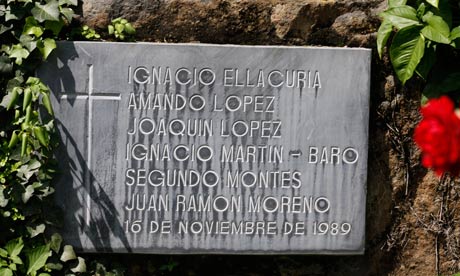 |
| "A stone engraved with the names of the six Jesuit priests killed during El Salvador's 1980-92 civil war." (Luis Galdamez/Reuters) |
By Stephen Burgen
The Guardian, August 9, 2011
"In one of the worst atrocities of El Salvador's dirty wars, members of the military murdered six Jesuit priests, their housekeeper and her 16-year-old daughter 22 years ago. Now an extradition battle looms after the defence ministry handed over nine of the 20 accused to the judicial authorities in a move that has surprised many human rights workers. The soldiers, all retired, include two generals. According to the El Salvador daily El Faro, the suspects presented themselves voluntarily so as to avoid being photographed in handcuffs. Five of the murdered priests were Spanish and in 2008 the Spanish Human Rights Association and the San Francisco-based Centre for Justice and Accountability demanded the extradition of the 20 accused. The extradition order was ratified by Spain's highest court. When the case first went to court in El Salvador in 1991, only two officers were found guilty of murder but were freed almost immediately under an amnesty law passed in 1993. Eloy Velasco, the Spanish judge in charge of the case, regards the 1991 trial as a fraud. 'These are crimes under international law,' said Esther Major, of Amnesty International's Central America team. 'We hope the court will pay regard to its international obligations when it rules on the extradition. We would expect them to allow this extradition and for justice to be sought in the Spanish courts, given that the amnesty law is such a huge obstacle to justice.'
The latest move appears to have been prompted by a demand from Interpol that El Salvador respond to the extradition order, obliging the authorities to take the accused into custody to assess whether there is a case to answer. Almudena Bernabéu, an international lawyer working for the CJA, said she hoped those detained 'would be kept in custody until a decision was made over extradition'. However, Eduardo Cardoza, a lawyer representing the accused, said they should not have been detained because they were already covered under the amnesty law. Judicial authorities said Carlos Calderón, a senior judge, would send a report to the supreme court 'which will decide whether or not to proceed with extradition' and will assign a judge to the case. The court has 45 days in which to reach a decision on extradition. [...]"














No comments:
Post a Comment
Please be constructive in your comments. - AJ